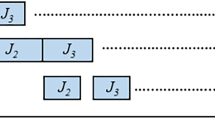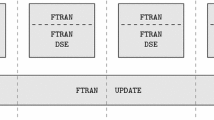Abstract
In the current study, an unrelated parallel machine scheduling problem with release dates is considered, which is to obtain a job assignment with minimal sum of weighted completion times. Although this problem is NP-hard in the strong sense, which renders the optimality seeking a formidable task within polynomial time, a 4-approximation algorithm based on the constant worst-case bound is devised and proved in comparison with the existing 16/3-approximation (Hall et al. in Math Oper Res 22(3):513–544, 1997). In the newly proposed algorithm, the original scheduling problem is divided into several sub-problems based on release dates. For each sub-problem, a convex quadratic integer programming model is constructed in accordance with the specific problem structure. Then a semi-definite programming approach is implemented to produce a lower bound via the semi-definite relaxation of each sub-problem. Furthermore, by considering the binary constraint, a branch and bound based method and a local search strategy are applied separately to locate the optimal solution of each sub-problem. Then the solution of the original scheduling problem is derived by integrating the outcomes of the sub-problems via the proposed approximation algorithm. In the numerical analysis, it is discovered that the proposed methods could always obtain a scheduling result within \(1\%\) of the optimal solution. And an asymptotic trend could be observed where the quality of solutions improves even further as the scale of the scheduling problem increases.














Similar content being viewed by others
References
Arnaout, J.-P. (2019). A worm optimization algorithm to minimize the makespan on unrelated parallel machines with sequence-dependent setup times. Annals of Operations Research, 1–21. https://doi.org/10.1007/s10479-019-03138-w.
Azizoglu, M., & Kirca, O. (1999a). On the minimization of total weighted flow time with identical and uniform parallel machines. European Journal of Operational Research, 113(1), 91–100.
Azizoglu, M., & Kirca, O. (1999b). Scheduling jobs on unrelated parallel machines to minimize regular total cost functions. IIE Transactions, 31(2), 153–159.
Balas, E., Ceria, S., Cornuejols, G., & Pataki, G. (1994). Updated semi-definite constraints. Tech. rep.: Technical Report, Carnegie Mellon University, Pittsburgh, USA.
Borchers, B. (1999). Csdp, ac library for semidefinite programming. Optimization Methods and Software, 11(1–4), 613–623.
Bülbül, K., & Şen, H. (2017). An exact extended formulation for the unrelated parallel machine total weighted completion time problem. Journal of Scheduling, 20(4), 373–389.
Chen, J. (2015). Unrelated parallel-machine scheduling to minimize total weighted completion time. Journal of Intelligent Manufacturing, 26(6), 1099–1112.
Chen, Z., & Powell, W. B. (1999). Solving parallel machine scheduling problems by column generation. INFORMS Journal on Computing, 11(1), 78–94.
Cheng, C., & Huang, L. (2017). Minimizing total earliness and tardiness through unrelated parallel machine scheduling using distributed release time control. Journal of Manufacturing Systems, 42, 1–10.
Daniels, R. L., Hoopes, B. J., & Mazzola, J. B. (1997). An analysis of heuristics for the parallel-machine flexible-resource scheduling problem. Annals of Operations Research, 70, 439–472.
Dietrich, B. L., & Escudero, L. F. (1993). On modelling the maximum workload allocation for parallel unrelated machines with setups. Annals of Operations Research, 43(7), 357–377.
Djurasevic, M., Jakobovic, D., & Knezevic, K. (2016). Adaptive scheduling on unrelated machines with genetic programming. Applied Soft Computing, 48, 419–430.
Gao, Y., Yuan, J., Ng, C., & Cheng, T. (2019). A further study on two-agent parallel-batch scheduling with release dates and deteriorating jobs to minimize the makespan. European Journal of Operational Research, 273(1), 74–81.
Hall, L. A., Schulz, A. S., Shmoys, D. B., & Wein, J. (1997). Scheduling to minimize average completion time: Off-line and on-line approximation algorithms. Mathematics of Operations Research, 22(3), 513–544.
Hoogeveen, H., Schuurman, P., & Woeginger, G. J. (1998). Non-approximability results for scheduling problems with minsum criteria. In International conference on integer programming and combinatorial optimization (pp. 353–366). New York: Springer.
Jäger, S. (2018). Approximating total weighted completion time on identical parallel machines with precedence constraints and release dates. Operations Research Letters, 46(5), 505–509.
Lancia, G. (2000). Scheduling jobs with release dates and tails on two unrelated parallel machines to minimize the makespan. European Journal of Operational Research, 120(2), 277–288.
Lee, Y., & Sherali, H. D. (1994). Unrelated machine scheduling with time-window and machine downtime constraints: An application to a naval battle-group problem. Annals of Operations Research, 50(1), 339–365.
Lenstra, J. K., Kan, A. R., & Brucker, P. (1977). Complexity of machine scheduling problems. Annals of Discrete Mathematics, 1, 343–362.
Li, K., & Yang, S. (2009). Non-identical parallel-machine scheduling research with minimizing total weighted completion times: Models, relaxations and algorithms. Applied Mathematical Modelling, 33(4), 2145–2158.
Lin, Y., & Lin, C. (2013). Dispatching rules for unrelated parallel machine scheduling with release dates. International Journal of Advanced Manufacturing Technology, 67(1–4), 269–279.
Lovász, L., & Schrijver, A. (1991). Cones of matrices and set-functions and 0–1 optimization. SIAM Journal on Optimization, 1(2), 166–190.
Mir, M. S. S., & Rezaeian, J. (2016). A robust hybrid approach based on particle swarm optimization and genetic algorithm to minimize the total machine load on unrelated parallel machines. Applied Soft Computing, 41, 488–504.
Mokotoff, E., & Jimeno, J. (2002). Heuristics based on partial enumeration for the unrelated parallel processor scheduling problem. Annals of Operations Research, 117(1–4), 133–150.
Nessah, R., Yalaoui, F., & Chu, C. (2008). A branch-and-bound algorithm to minimize total weighted completion time on identical parallel machines with job release dates. Computers & Operations Research, 35(4), 1176–1190.
Phillips, C., Stein, C., & Wein, J. (1997). Task scheduling in networks. SIAM Journal on Discrete Mathematics, 10(4), 573–598.
Rendl, F. (2016). Semidefinite relaxations for partitioning, assignment and ordering problems. Annals of Operations Research, 240(1), 119–140.
Rodriguez, F. J., Blum, C., García-Martínez, C., & Lozano, M. (2012). Grasp with path-relinking for the non-identical parallel machine scheduling problem with minimising total weighted completion times. Annals of Operations Research, 201(1), 383–401.
Rodriguez, F. J., Lozano, M., Blum, C., & GarcíA-MartíNez, C. (2013). An iterated greedy algorithm for the large-scale unrelated parallel machines scheduling problem. Computers & Operations Research, 40(7), 1829–1841.
Schulz, A. S., & Skutella, M. (2002). Scheduling unrelated machines by randomized rounding. SIAM Journal on Discrete Mathematics, 15(4), 450–469.
Sherali, H. D., & Adams, W. P. (1994). A hierarchy of relaxations and convex hull characterizations for mixed-integer zeroone programming problems. Discrete Applied Mathematics, 52(1), 83–106.
Siepak, M., & Józefczyk, J. (2014). Solution algorithms for unrelated machines minmax regret scheduling problem with interval processing times and the total flow time criterion. Annals of Operations Research, 222(1), 517–533.
Sitters, R., & Yang, L. (2018). A (\(2+\epsilon \))-approximation for precedence constrained single machine scheduling with release dates and total weighted completion time objective. Operations Research Letters, 46(4), 438–442.
Skutella, M. (2001). Convex quadratic and semidefinite programming relaxations in scheduling. Journal of the ACM, 48(2), 206–242.
Skutella, M. (2016). A 2.542-approximation for precedence constrained single machine scheduling with release dates and total weighted completion time objective. Operations Research Letters, 44(5), 676–679.
Skutella, M., Sviridenko, M., & Uetz, M. (2016). Unrelated machine scheduling with stochastic processing times. Mathematics of Operations Research, 41(3), 851–864.
Smith, W. E. (1956). Various optimizers for single-stage production. Naval Research Logistics, 3(1–2), 59–66.
Tang, L., & Zhang, Y. (2011). A new lagrangian relaxation algorithm for scheduling dissimilar parallel machines with release dates. International Journal of Systems Science, 42(7), 1133–1141.
Unlu, Y., & Mason, S. J. (2010). Evaluation of mixed integer programming formulations for non-preemptive parallel machine scheduling problems. Computers & Industrial Engineering, 58(4), 785–800.
van Den Akker, J. M., Hoogeveen, J. A., & van de Velde, S. L. (1999). Parallel machine scheduling by column generation. Operations Research, 47(6), 862–872.
Vredeveld, T., & Hurkens, C. (2002). Experimental comparison of approximation algorithms for scheduling unrelated parallel machines. INFORMS Journal on Computing, 14(2), 175–189.
Yalaoui, F., & Chu, C. (2006). New exact method to solve the \(pm|r_j|\sum c_j\) schedule problem. International Journal of Production Economics, 100(1), 168–179.
Zhang, X., Xu, D., Du, D., & Miao, C. (2016). Approximate algorithms for unrelated machine scheduling to minimize makespan. Management, 12(2), 771–779.
Acknowledgements
The authors are grateful for the financial support partly from the Natural Science Foundation of China under Grant Nos. 71871203, 51305400, Zhejiang Provincial Natural Science Foundation of China under Grant No. LY18G010017, and Northern Illinois University.
Author information
Authors and Affiliations
Corresponding author
Additional information
Publisher's Note
Springer Nature remains neutral with regard to jurisdictional claims in published maps and institutional affiliations.
Rights and permissions
About this article
Cite this article
Pei, Z., Wan, M. & Wang, Z. A new approximation algorithm for unrelated parallel machine scheduling with release dates. Ann Oper Res 285, 397–425 (2020). https://doi.org/10.1007/s10479-019-03346-4
Published:
Issue Date:
DOI: https://doi.org/10.1007/s10479-019-03346-4




